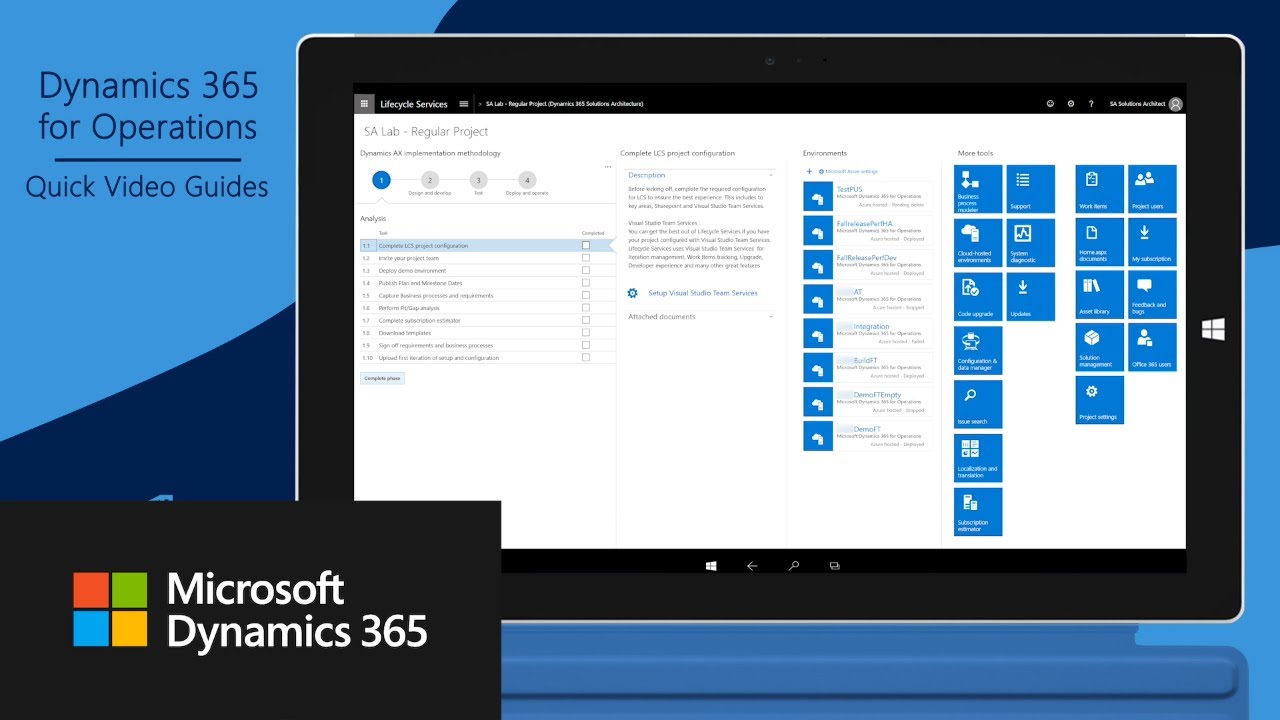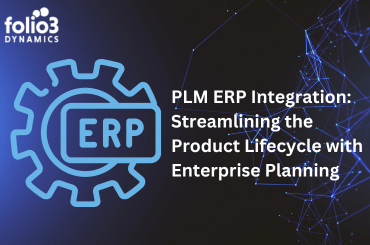Table of Contents
Microsoft Dynamics 365 is software designed to help companies build a strong relationship with their clientele. The software enables businesses to create and maintain a customer dataset, infer consumer preferences, interact with customers and provide around-the-clock customer support.
Considering the wide range of tasks that Microsoft Dynamics is supposed to perform, it makes sense to have a channel that can keep track of any updates made in Microsoft Dynamics and monitor the software’s performance to ensure that accurate information is provided to the correct target audience at the right time.
So, what exactly helps Microsoft Dynamics control its implementations and upgrades? The answer lies in Lifecycle Services.
Lifecycle Services (LCS) is a collaborative portal that provides you with a platform to manage and oversee implementations in Microsoft Dynamics 365. This article will discuss the workings of Lifecycle Services and how exactly it works with Microsoft Dynamics 365 to benefit both companies and their customers.
What is Lifecycle Services (LCS)?
Lifecycle Services (LCS) is a Microsoft Azure-based collaborative portal that enables you to monitor any updates, implementations, and updates made in Microsoft Dynamics 365.
Managing Microsoft Dynamics implementations is crucial in guaranteeing that correct information has been exchanged between businesses and their customers. Thus, Lifecycle Services is a cloud-based solution that strengthens the collaborative aspect of Microsoft Dynamics 365.
Microsoft Dynamics Lifecycle Services create a cohesive environment where businesses can work independently as well as with their clientele. The close-knit community provided by LCS means that updates in Microsoft Dynamics 365 reach their target audience faster, which makes implementations more effective.
How does Lifecycle Services work with Microsoft Dynamics 365?
Lifecycle Services is available through a web browser, and can only be accessed if you have a Microsoft Live account.
Once accessed, LCS presents with a homepage that includes Projects, Announcements, and Tools. The Projects option will display all the assignments you are working on using Lifecycle Services. The Announcements section is essentially an information center regarding the workings of LCS. It contains data about LCS released by Microsoft’s team. The Tools section is equipped with features that let you work on a new Project.
To add a new task under your Project section, you simply click the option to create a new Project and begin working on it.
Now that we know what Lifecycle Services are and how it operates, we will move on to explain how it works with Microsoft Dynamics 365.
Management of Methodologies:
Methodologies are used to track the progress of implementation from its beginning to its point of completion. Methodologies are used in each step of implementation. An implementation is generally divided into four parts,
- Analysis phase
- Designing and developing phase
- Testing phase
- Deployment and operating phase
Each part or phase of implementation consists of its tasks and methodologies are used to outline and oversee the fulfillment of those tasks.
Dynamics LCS enables users to manage their methodologies so that the implementation process becomes more efficient. Dynamics 365 Lifecycle Services resources include the option to operate several methodologies at a single point in time and store them in your LCS folder. This means that once a methodology suited to a particular business has been made, it can be stored and used as a reference for future customers.
Project Planning
Project planning involves creating and working on a new task on the Projects option of LCS.
The Projects section of your LCS display shows an Action Center where you have options to implement SharePoint Online and Visual Studio Team Services. Once you find these options, you will be able to grant access to your project to be able to open directly in SharePoint or Visual Studio Team Services. SharePoint will provide a platform to create and store documents relevant to your project, while Visual Studio Team Services will manage the graphics and presentation of your work.
The center of your Projects section will focus on the methodology of your task. You will be able to divide your work into phases, each with its methodology, and then oversee the implementation of each phase.
Project planning in LCS also includes the Complete LCS Project Configuration, which is an area that allows you to make changes to the implementation Lifecycle Services implementation network. The configuration center also has an option that allows you to control your project environment, which influences the general presentation of your work.
The next part of project planning comprises the tools that Lifecycle Services offers to work on your task. Here we have compiled a list of Dynamics 365 Lifecycle Services resources that aid in project management.
- Cloud-based environment
Lifecycle Services is a cloud-based platform and it offers a feature known as “Cloud-hosted environments” that collaborates with Azure to work on Microsoft Dynamics.
- Cloud-based customer support
Cloud-based customer support lets you report any problems you might encounter while working in your project’s environment to the customer support team. Customer support and project environment both being cloud-based leads to more effective collaboration.
- Analysis for customization
Lifecycle Services can generate in-depth analysis on the customization preferred by businesses. This leads to more effective implementations and popular upgrades and updates.
- Issue search
Issue search is a feature that helps businesses navigate their way through Lifecycle Services by providing a database of problems that past users have faced while working on Microsoft Dynamics. LCS also labels the problems, and states their solutions if they have been solved, making it easier for companies to gather relevant data, save time and boost their efficiency.
- A preview into configuring and managing data
Lifecycle Services has the feature to copy configuration and data management previews, so and export them to other LCS projects you are working on, or other implementations and methodologies that are a part of LCS. This option saves a lot of time and manual labor and makes the process of creating a new project significantly smoother.
- An option for estimating the number of licenses
This feature lets businesses determine how many licenses they will need to acquire to run their projects. The information helps companies plan their project operations and makes the process more streamlined.
- An option to oversee updates and upgrades
Lifecycle services enable businesses to oversee any changes in Microsoft Dynamics, including new updates and upgrades that can propel the business’s productivity and profitability and enhance its relationship with its clients. Being aware of upgrades also gives companies more leverage to manage them and change their project plans accordingly.
- Overseeing the Microsoft Dynamics system
LCS provides its users a platform to monitor Microsoft Dynamics administrative system, which helps companies plan and execute their implementations more effectively.
- Downloading tools
Lifecycle Services offers a wide array of tools on its Tools page that can be used to plan projects and make new implementations.
- Managing usage profiles
Usage profiling is a toolset offered by Lifecycle Services that allows businesses to qualitatively and quantitively define their customer population. This means that companies will be able to estimate the population size of their consumers and makes predictions of their tastes based on information like their age and gender. An increased amount of data relating to their clientele will lead to businesses making better decisions which will let them maximize their profitability.
- The LCS library
The LCS library consists of a Shared Asset Library and an Asset Library. The Shared Asset Library focuses on sharing your project content with other creators so that multiple people can work on a project at once. It is essentially a tool that enriches collaboration. The Asset Library is a personalized storage space for your documents that cater to your project. It does not include other parties’ information and is a space for individual work.
- LCS globalization portal
The globalization portal is a space that allows you to access information about other users’ projects and seek answers to any questions you might have. It acts as a collaborative channel.
Business Process Modeler
The Business Process Modeler is a newly added feature to Lifecycle Services that helps enrich collaboration between Microsoft Dynamics 365.
The Business Process Modeler is a platform to create and oversee a library of project recordings. You can create different types of libraries, such as corporate libraries and global libraries.
A corporate library can store task recordings relevant to future projects and can act as information storage to plan any new implementation you want to execute.
A global library is already designed for you and has information that has been previously collected from users who have been working on projects similar to yours. This type of library requires little to no additional changes as it is already stocked with organized data.
Microsoft Dynamics 365 now has the option of editing its task recordings, meaning you can stop in the middle of a recording, make edits, or delete some parts and then finish your recording. This newly added feature makes it much easier to store information accurately.
Lifecycle Services can store task recordings made on Microsoft Dynamics 365. The recordings can be filed into the global or corporate libraries offered by LCS. Lifecycle Services lets users edit task recordings on its platform and send the recordings back to Microsoft Dynamics 365. Hence, LCS integrates with Microsoft Dynamics 365 to act as a collaborative storage space for information in the form of task recordings that can be edited at any point in time
Lifecycle Services also has a feature called “Task Guide”, which helps you navigate your way around building your task recording on Microsoft Dynamics 365, editing it, and transferring it between different channels. This feature is a great source of help to users who are new to both Microsoft Dynamics 365 and Lifecycle Services.
Establishing a Hierarchy Pattern
The Business Process Modeler operates using global and corporate libraries. These libraries have a hierarchical structure that helps organize stored information.
To establish a new hierarchy structure or to make changes in an already established structure, you need to go on global libraries, right-click on global structures, and copy a new structure to your libraries. after you have added a new library to your dataset, you can add information to it and edit it according to your choice. This means that you are also free to make changes to its hierarchy pattern.
Improving the predictability of implementations on Microsoft Dynamics 365
Lifecycle Services allow users to improve the predictability of implementations executed through Microsoft Dynamics 365. This is because LCS aims to make streamline project planning and collaboration across Microsoft Dynamics 365, which means that accurate information is provided to users at the right time.
Access to relevant information at relevant times due to effective collaboration is a huge asset granted by Lifecycle Services because it helps businesses realize what changes need to be made to enrich their customer relationships. This leads to better implementations and upgrades, which automatically boosts the predictability and performance of any new implementations in the market.
Make collaboration on Microsoft Dynamics 365 easier
Since Lifecycle Services is an Azure-based platform, it specializes in integration and focuses on making collaboration more effective. Creating a collaborative work environment makes it easier for businesses to communicate with their clientele and boost the value of new upgrades as well as speed up the process of implementation.
Estimating the use of implementations
Lifecycle Services also offers features that help estimate the use of Microsoft Dynamics 365 implementations. As mentioned above, Lifecycle Services offers User Profiles, that describe a company’s clientele quantitively and qualitatively, and match the customers to the use of new implementations.
Due to this, companies can deduce the effectiveness of their implementations. Estimating the use of implementations is an important step to generating more effective implementations and improving their predictability, as discussed above.
Pinpoint problems in Microsoft Dynamics 365
Lifecycle Support has the tools required to scan Microsoft Dynamics 365 and locate any threats, malware issues, and viruses to protect the running of the operation. Along with this, Lifecycle Services’ scans can identify any file that might be relevant to your project, making it easier for you to collect data.
Conclusion
Lifecycle Services is an excellent platform to rely on to enhance your collaboration and maximize the benefits of Microsoft Dynamics 365.
LCS provides businesses with the toolset required to set up effective communication channels and make teamwork more productive and efficient. Not only does Lifecycle Services enhance the Microsoft Dynamics 365 experience, but it also helps users navigate their way around Microsoft Dynamics with clear instructions and around-the-clock customer care. This means that even a complete novice can move comfortably around Microsoft Dynamics 365 with the help of Lifecycle Services.
Features like task recording help businesses organize their data more comprehensively and the breakdown of projects into separate tasks with their methodologies makes the process much simpler. With all the relevant information at your fingertips, and the toolset required to manage that information, Lifecycle Services is the best option for making sure that you use Microsoft Dynamics 365 to its fullest.






